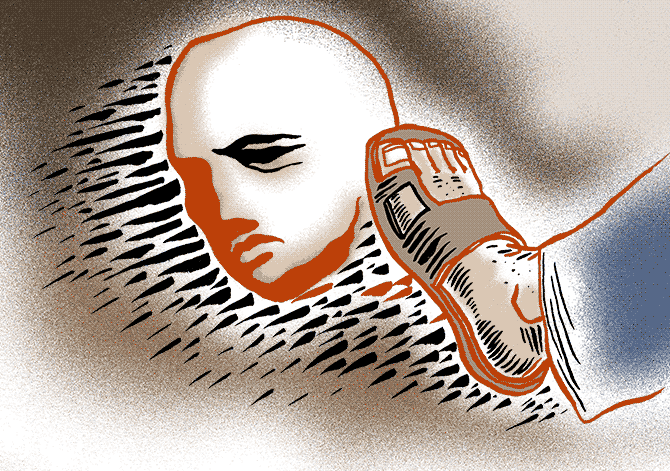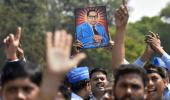'When one joins an office most of the initial conversations would always be efforts to identify the new entrant's caste.'
'Once one says that one is a bachelor still, the next thing they would say will be: "We know an educated girl from among our acquaintances, what caste do you belong to?'
'If it is education that is being discussed, they would definitely ask, "Under which quota do you come?",' recalls P Rajeskannan.
Illustration: Dominic Xavier/Rediff.com

In all spheres of society caste has pierced its sharp nails.
Caste keeps revealing itself directly and indirectly depending on the circumstances.
Schools, colleges, work places are where caste shows itself indirectly.
In temple festivals, marriage celebrations and funerals, caste reveals itself nakedly.
Where schools are concerned, before the times when private school buses arrived to take school kids to faraway schools, school education was normally in a school near one's village.
All the students knew from where every student came and who their parents were. 'He is from Ambedkar Street,' 'He is a boy from the Pallar Street,' were normal comments indicating the caste of a student.
In colleges, even as they fill up the forms they get to know the castes, and friendships are formed based on that.
In offices, different kinds of efforts are made to find out about the caste of a person.
When one joins an office most of the initial conversations would always be efforts to identify the new entrant's caste.
Once one says that one is a bachelor still, the next thing they would say will be: 'We know an educated girl from among our acquaintances, what caste do you belong to?'
If it is education that is being discussed, they would definitely ask, 'Under which quota do you come?'
If one says in general BC, MBC or SC they would begin asking about the sub-castes of those groups.
Or they would mention the name of a person known to them and ask if you were related to that person.
Or it can be a more direct and somewhat shocking question: 'Which community do you belong to?'
During weddings, temple festivals and funerals, when they get together they will spend their time glorifying their caste or talk about how the lowered castes are coming up and ridicule their progress.
One is prepared for caste being an important factor in these situations.
What I would like to share here are unexpected situations when I was caught in the terrible clutches of caste.
I belong to Periyeri near Thalaivasal in Salem district.
There are two groups of Vanniyar living in this district known as Arasu Vanniyar and Padaiyachi.
My family belongs to the Arasu Vanniyar group.
I completed my entire school education staying with my grandparents, at Kongavalli near Aathoor.
In government high schools, every now and then there would be squabbles among students based on caste.
Once an inter-school kabaddi competition took place.
The final round was between our school team and the Dhammampatti school team.
The boys in our team were all Dalit students.
So the non-Dalit students of our school cheered the rival team and stood by them.
The next day this became an issue and the result was an outbreak of fisticuffs and it went to the extent of the school being closed for an unspecified period of time.
An incident that occurred when I was in the eleventh is one that fills me with persistent feelings of guilt and shame.
A boy from another class next to ours would come often and talk to his friends in our class.
Since he was a Dalit, the other students did not like this.
One day, during the recess, that boy came to our class, chatted with his friends and left.
Some non-Dalit students who were outside rebuked him and came towards the first row where I was sitting.
They told me to tell the teacher that I had lost the money kept in my notebook.
I agreed and went and told the teacher that I had kept thirty rupees in my notebook and that it was lost.
Immediately those students stood up and mentioned the name of the boy from the other class and said that he came often to our class and that this should be settled one way or the other, else they would boycott the classes.
Some students went out and called the other students to come out also.
With the intensity and stubbornness of that age, they even argued that that Dalit student must be rusticated from the school.
Excerpted from Black Coffee in a Coconut Shell, Caste as Lived Experience edited by Perumal Murugan, Professor, Presidency College; Chennai, C S Lakshmi (Translator) - Independent Researcher in Women's Studies; 2017/252 pages/ Paperback: Rs 595 (9789352804979)/ SAGE Yoda Press, with the publisher's kind permission.










